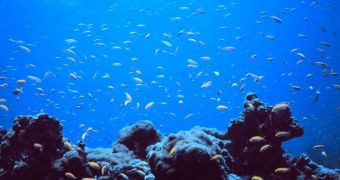Scientists say that a small number of islands located right on the Equator could avoid suffering the effects of global warming, thanks to an interplay of factors that could mitigate this phenomenon.
By the end of the century, temperatures across the equatorial sector of the Pacific Ocean are bound to increase substantially, computer models indicate. This will pose an extreme strain on ecosystems centered on coral reefs, which are the main hot spots for biodiversity at sea.
Large amounts of carbon dioxide soaked up from the atmosphere will also lead to increased acidification of the waters, a phenomenon that is known to lead to so-called coral bleaching and death.
In a new study, scientists show that the situation may not be as dire as initially calculated for a small area of the equatorial Pacific, where ocean currents will be affected by climate change in such a way that they will cancel out the effects of global warming.
Around 33 atolls in the island nation of Kiribati will benefit from this effect. This is very important news for the country, which is situated at very low altitudes, and therefore at risk of being flooded in a scenario where global sea levels rise even slightly.
Within 2 degrees North and South of the Equator, an isolated climate change refuge for corals and fish may develop in the coming decades, scientists say. Details of how this will occur were published in the April 29 issue of the top scientific journal Nature Climate Change.
“The finding that there may be refuges in the tropics where local circulation features buffer the trend of rising sea surface temperature has important implications for the survival of coral reef systems,” explains scientist David Garrison.
He holds an appointment as a program director with the National Science Foundation (NSF) Division of Ocean Sciences (DOS), the organization that funded the new investigation. The study was led by Woods Hole Oceanographic Institution (WHOI) scientists Kristopher Karnauskas and Anne Cohen.
“Global models predict significant temperature increases in the central tropical Pacific over the next few decades, but in truth conditions can be highly variable across and around a coral reef island,” Cohen explains.
“To predict what the coral reef will experience in global climate change, we have to use high-resolution models, not global models,” the investigator concludes.

 14 DAY TRIAL //
14 DAY TRIAL //